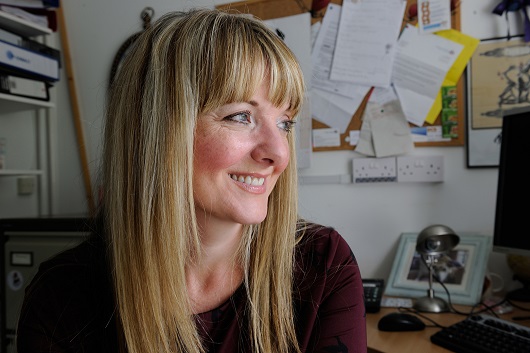St Andrews – a dementia friendly community

Dr Maggie Ellis, Fellow in Dementia Care at the University, is spearheading a new initiative aimed at making St Andrews a dementia friendly community. Here she shares with us the background to her work and how her innovative techniques have been helping individuals with dementia and their families in the local area and beyond.
“My current work involves two main topic areas within the broader field of dementia. Firstly, I am very interested in facilitating communication between individuals with very advanced dementia and their carers and family members. People with very advanced dementia often lose the ability to use and understand speech and, as such, become excluded from the social world.
Professor Arlene Astell and I developed a non-verbal communication technique called ‘Adaptive Interaction’ which allows connection to occur without having to rely on speech. This approach has generated a lot of interest in the field of dementia care, eg, a training commission from the Alzheimer Society and endorsement from Alzheimer Scotland.
Secondly, my work involves exploring attitudes towards dementia and those living with the illness. This is extremely important as the amount we know about dementia and how we regard those with a diagnosis relates directly to the ways people with dementia are treated.
My work as a Fellow in Dementia Care involves teaching, consultancy, applied research and training. I teach a large Senior Honours module on the Psychology of Dementia where I introduced my students to the Dementia Friends initiative promoted by Alzheimer Scotland.
To my delight, almost all of them signed up to become Dementia friends and wanted to learn how they could contribute towards helping individuals with dementia in the local community. I thought that this could be possible through the Dementia Friendly Communities initiative. As part of my role as Fellow in Dementia Care at the University of St Andrews, I aim to make St Andrews a dementia friendly community. The Alzheimer’s Society has set out a clear pathway of how this might be achieved including the development of a local ‘Dementia Alliance’.”
Baroness Susan Greenfield has lent her support to Dr Ellis’ project:
“As an honorary graduate and friend of the University of St Andrews, I am delighted to lend my support to the Dementia Friendly Communities initiative. Dementia is a subject that is close to my heart and one that affects us all in one way or another. The work that Dr Maggie Ellis is heading will involve the whole community working together to make St Andrews a more dementia friendly place to live. The more we learn about the condition, the more we can help those with a diagnosis and those who care for them. I wish St Andrews the very best of luck in this venture and will be very interested to hear of its impact.”
The Dementia Friendly St Andrews initiative was launched at the Byre Theatre on Tuesday 24 May. Dr Ellis also presented her work on communication with people with advanced dementia at another event, also at the Byre, on Tuesday 31 May: Memories & Microscope, which was organised by the Alzheimer’s Research UK Scotland Network with the aim of informing the general public about the research going on in Fife in the area of Alzheimer’s disease and dementia. Speakers were from NHS Fife, Alzheimer’s Research UK and the University’s School of Psychology & Neuroscience and School of Medicine.
Further information:
Dementia Friendly St Andrews’ website
Dementia Friendly St Andrews’ Facebook Group
Category Research